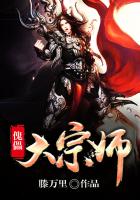To that cruel superstition of his age,witchcraft,I think there is no allusion in Walton.Almost as uncanny,however,is his account of Donne's preparation for death 'Several charcoal fires being first made in his large study,he brought with him into that place his winding-sheet in his hand,and having put off all his clothes,had this sheet put on him,and so tied with knots at his head and feet,and his hands so placed as dead bodies are usually fitted,to be shrouded and put into their coffin or grave.Upon this urn he thus stood,with his eyes shut,and with so much of the sheet turned aside as might show his lean,pale,and death-like face,which was purposely turned towards the east,from which he expected the second coming of his and our Saviour Jesus.
In this posture he was drawn at his just height,and,when the picture was fully finished,he caused it to be set by his bedside,where it continued,and became his hourly object till death.'
Thus Donne made ready to meet the common fate:-'That body,which once was a temple of the Holy Ghost,is now become a small quantity of Christian ashes.But I shall see it reanimated.'
This is the very voice of Faith.Walton was,indeed,an assured believer,and to his mind,the world offered no insoluble problem.But we may say of him,in the words of a poet whom he quotes:-'Many a one Owes to his country his religion;And in another would as strongly grow Had but his nurse or mother taught him so.'
In his account of Donne's early theological studies of the differences between Rome and Anglicanism,it is manifest that Izaak thinks these differences matters of no great moment.
They are not for ****** men to solve:Donne has taken that trouble for him;besides,he is an Englishman,and 'Owes to his country his religion.'
He will be no Covenanter,and writes with disgust of an intruded Scots minister,whose first action was to cut down the ancient yews in the churchyard.Izaak's religion,and all his life,were rooted in the past,like the yew-tree.He is what he calls 'the passive peaceable Protestant.''The common people in this nation,'he writes,'think they are not wise unless they be busy about what they understand not,and especially about religion';as Bunyan was busy at that very moment.In Walton's opinion,the plain facts of religion,and of consequent morality,are visible as the sun at noonday.
The vexed questions are for the learned,and are solved variously by them.A man must follow authority,as he finds it established in his own country,unless he has the learning and genius of a Donne.To these,or equivalents for these in a special privy inspiration,'the common people'of his day,and ever since Elizabeth's day,were pretending.This was the inevitable result of the translation of the Bible into English.Walton quotes with approval a remark of a witty Italian on a populace which was universally occupied with Free-will and Predestination.The fruits Walton saw,in preaching Corporals,Antinomian Trusty Tompkinses,Quakers who ran about naked,barking,Presbyterians who cut down old yew-trees,and a Parliament of Saints.Walton took no kind of joy in the general emancipation of the human spirit.The clergy,he confessed,were not what he wished them to be,but they were better than Quakers,naked and ululant.To love God and his neighbour,and to honour the king,was Walton's unperplexed religion.Happily he was saved from the view of the errors and the fall of James II.a king whom it was not easy to honour.His social philosophy was one of established rank,tempered by equity and Christian charity.If anything moves his tranquil spirit,it is the remorseless greed of him who takes his fellow-servant by the throat and exacts the uttermost penny.How Sanderson saved a poor farmer from the greed of an extortionate landlord,Walton tells in his Life of the prelate,adding this reflection:-'It may be noted that in this age there are a sort of people so unlike the God of mercy,so void of the bowels of pity,that they love only themselves and their children;love them so as not to be concerned whether the rest of mankind waste their days in sorrow or shame;people that are cursed with riches,and a mistake that nothing but riches can make them and theirs happy.'
Thus Walton appears,this is 'the picture of his own disposition,'in the Lives.He is a kind of antithesis to John Knox.Men like Walton are not to be approached for new 'ideas.'They will never make a new world at a blow:they will never enable us to understand,but they can teach us to endure,and even to enjoy,the world.Their example is alluring:-'Even the ashes of the just Smell sweet,and blossom in the dust.'














